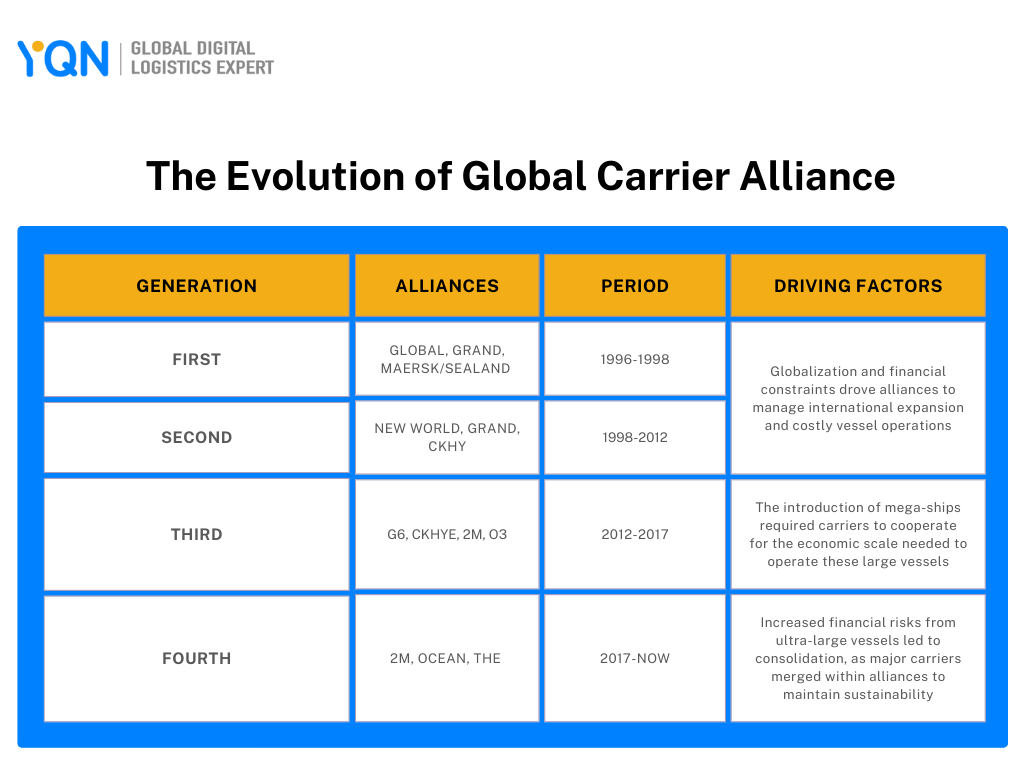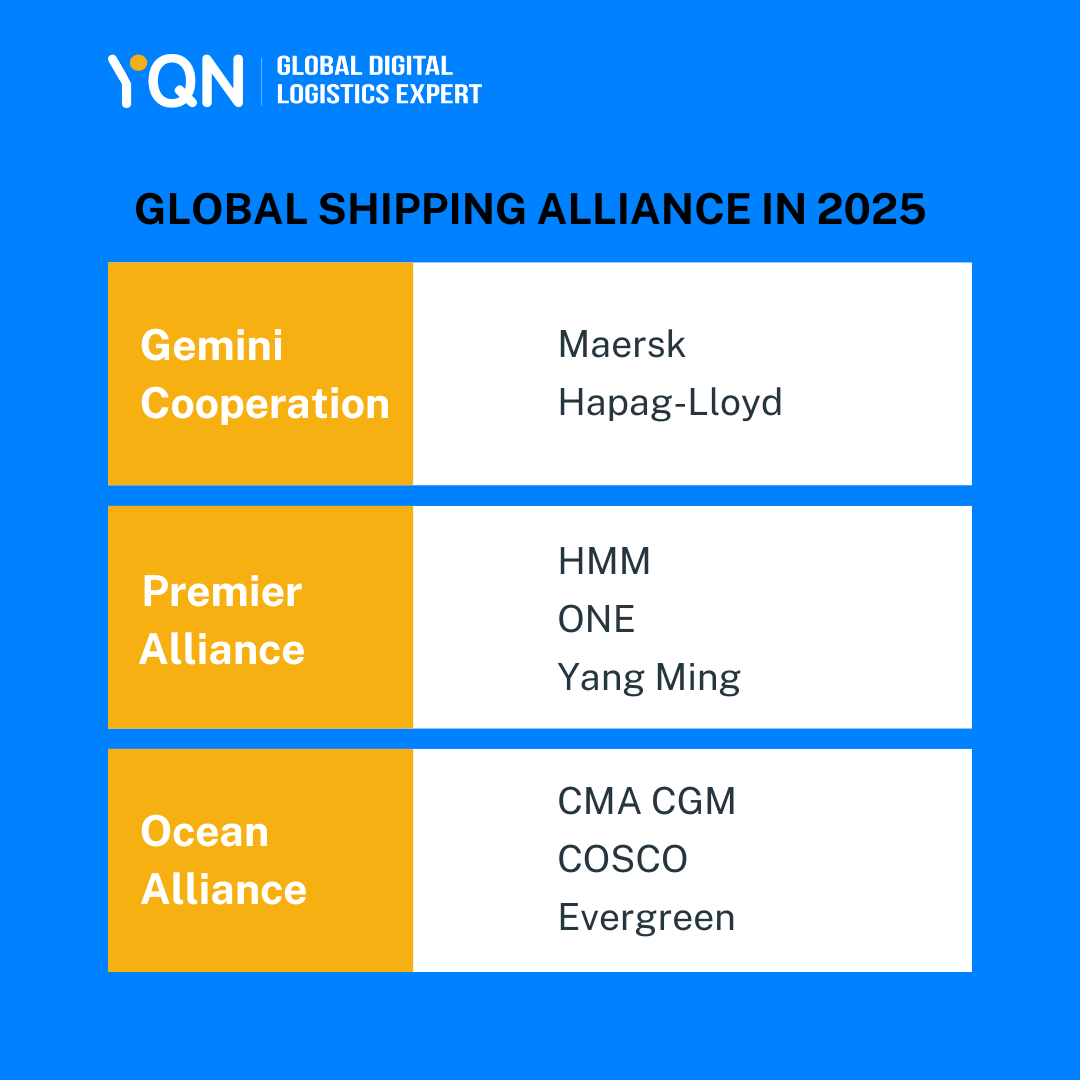Navigating the Seas: The Future of Ocean Shipping Alliances in 2025
YQN Operation Team | November 8, 2024
In 2025, the landscape of global shipping is set for a major shift. With the world's two largest container shipping giants, Maersk and MSC, splitting their longstanding alliance, and Hapag-Lloyd joining forces with Maersk, the world of ocean carrier partnerships will experience a dramatic reshuffle. What does this mean for the future of global trade? Read on to find out how this change could reshape the flow of goods around the world.
What is an Alliance in Global Shipping?
Global alliances, also known as strategic alliances, have been a defining feature of the container shipping industry since their emergence in the mid-1990s. These cooperation agreements between liner shipping companies are designed to enhance operational efficiencies and service coverage on a global scale.
Unlike earlier forms of collaboration, which were primarily focused on price coordination and capacity management, modern alliances enable shipping giants to share resources such as vessels, sailing schedules, itineraries, containers, and even joint terminals. This cooperative approach allows competing firms to reduce costs, optimize operations, and offer a broader network of services to customers.
Over the years, global shipping alliances have evolved through four distinct phases, driven by shifting market conditions, regulatory changes, and the need for greater economies of scale.

Who’s in the current alliance?
Today, the global shipping industry is dominated by three major alliances: 2M Alliance, Ocean Alliance, and THE Alliance.
2M Alliance: Maersk and MSC
Launched in 2015, the 2M Alliance focuses on delivering competitive and cost-efficient services on key trade routes, including Asia-Europe, Transatlantic, and Transpacific trades.
THE Alliance: Hapag-Lloyd, HMM, ONE, Yang Ming
Established in 2016, THE Alliance operates 260 vessels across a variety of east-west shipping trades, including Asia-North Europe, Asia-Mediterranean, Transpacific-West Coast, Transpacific-East Coast, Asia-Middle East, Asia-Red Sea, and Transatlantic routes.
Ocean Alliance: CMA CGM, COSCO, Evergreen
Founded in 2017, Ocean Alliance covers a wide range of services, including Transpacific, Transatlantic, Asia-Red Sea, Asia-Europe, Asia-Mediterranean, and Asia-Middle East routes.
The Future Outlook
In 2025, the global shipping alliance landscape will undergo significant changes, with new collaborations emerging and others dissolving:
- Maersk and MSC will end their 10-year partnership in the 2M Alliance in January 2025.
- Hapag-Lloyd will exit THE Alliance.
- Maersk and Hapag-Lloyd will form a new operational collaboration.

Gemini Cooperation: Maersk and Hapag-Lloyd
Starting in February 2025, Maersk and Hapag-Lloyd will launch a long-term collaboration called Gemini Cooperation. The ambition is to provide reliable, interconnected, and sustainable shipping services. Key highlights include:
- Vessels: Approximately 340 ships, with a combined capacity of 3.7 million TEUs.
- Sustainability: Many vessels are prepared to use cleaner fuels.
- Routes: The cooperation will cover major trade routes, including Asia-Europe, Asia-Middle East, Transpacific, and Atlantic.
- Red Sea: Due to safety concerns, the alliance plans to avoid the Red Sea for now, opting to sail around the Cape of Good Hope until conditions improve.
Premier Alliance: HMM, ONE, Yang Ming
From February 2025, HMM, ONE, and Yang Ming will continue their partnership under the Premier Alliance, which will last for five years. The aim is to provide dependable, direct port-to-port container services.
- Routes: Premier Alliance will operate on key East-West trades, including: Asia-North America West Coast, Asia-North America East Coast, Asia-Mediterranean, Asia-North Europe, Asia-Middle East.
- MSC Collaboration: MSC will work with Premier Alliance specifically on the Asia-Europe trade.
Ocean Alliance: CMA CGM, COSCO, Evergreen
The Ocean Alliance remains unchanged. CMA CGM, COSCO, and Evergreen have extended their cooperation until 2032, continuing their established routes across Transpacific, Asia-Europe, and other major trade lanes.
Conclusion
The 2025 reshuffle of global shipping alliances signals a major transformation in the industry. With Maersk and MSC parting ways, and new collaborations like Gemini Cooperation and Premier Alliance emerging, shipping companies are focusing on operational efficiency, sustainability, and service reliability.
YQN has established official partnership with more than 300 ship owners, including Maersk, MSC, CMA CGM, COSCO Shipping and HMM. If you need more information, please contact us at info@yqn.com.





